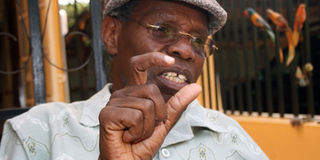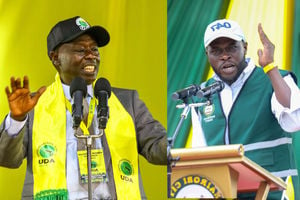Detention was legalised torture

Koigi wa Wamwere. My only disappointment is we have detention in the new Constitution. It means dictatorship is not dead yet. PHOTO|FILE.
What you need to know:
- When Kenyans fought for uhuru, they wanted an end to white apartheid, colour bar that segregated and discriminated against Africans, independence and freedom.
- Reasons for detention were never disclosed and nor were those for release and future freedom. Only silence could give us security against detention.
- But to end my first detention, Jomo Kenyatta, my childhood hero had to die in 1978. And to end my second, Moi had to play God in 1984.
Detention without charge or trial was the nightmare that marred my dream of freedom after independence.
When Kenyans fought for uhuru, they wanted an end to white apartheid, colour bar that segregated and discriminated against Africans, independence and freedom.
When independence came, it was self-rule without democracy. Detained by white rulers, no one thought African leaders would detain their own people after independence.
Soon after independence, I realized our lives were not getting better. Black leaders were taking the place of white masters but nothing more.
I learnt, with higher education, I could join the Canaan of black elite. After passing my exams, I got a scholarship to Cornell University in America.
In America, I saw a heaven on earth that our people had dreamt about and the democracy that one party dictatorship had killed back home.
This was the life I wanted, but in Kenya, not America.
Over time, it became clear that the Mau Mau revolution had been betrayed and needed rescue to end foreign rule, poverty and oppression.
White was no longer synonymous with evil or black with good.
Overcome poverty
As I compared rich America with poor Kenya, I realised poverty was not God given or eternal. Kenyans could overcome it just as Americans had.
With this clarity, I gave up my university education and returned home to join the struggle to end poverty and one party dictatorship.
For daring this some people called me mad.
I was never told but President Jomo Kenyatta detained me for decrying betrayal of Mau Mau and demanding democracy and land for poor people.
As for Moi, he warned me that if I did not let sleeping dogs lie, I would myself be sent to sleep, and I was for 13 years.
After assassination of J.M. Kariuki, I was taken to Kamiti Prison to be subjected to the horrors of terrible torture under detention.
As I would learn, detention was legalised physical and psychological torture. It was routine, systematic and merciless.
Its purpose was to terrorise, destroy and instil permanent fear of opposition politics, dictatorship and dictator-president.
Scarecrow
It came in many forms that reinforced one another to destroy without failure. Destroyed, a detainee was a scarecrow to warn the larger public against politics of opposition.
Torture made detention a central pillar of one-party dictatorship.
Torture in detention started in hiding us in some undisclosed prison. Though un-convicted, detentions kept us in prison.
Detention denied us communication with family to kill us with anxiety. Our wives and children were denied normal life to hurt us.
Detention took away all our democratic rights including right to defence in a court of law. It subjected us to unending harassments.
Reasons for detention were never disclosed and nor were those for release and future freedom. Only silence could give us security against detention.
Detainees were treated worse than convicted criminals. It fed us half-cooked ugali and nauseating boiled vegetable water with snails and spiders.
Prison doctor gave us turungi or strong tea for medicine! Detention kept us in solitary, indoor confinement for 23-and-a-half hours every day.
It denied us exercises, calling them dangerous. It beamed electric light on us day and night.
Mere numbers
Detention denied us privacy. It kept us with mentally sick prisoners for punishment. It denied us news, music or books. It disallowed us talk with fellow detainees and prison guards.
Detention made us non-persons or mere numbers – 7/75 for me. Indefinite detention made us susceptible to untreated depressions, blood Pressure, strokes and mental breakdowns.
Detention used disease as torture by denying us treatment in hospital. Detention did not end with release.
Once detained, we were rendered permanently unemployable.
The Bible
When authorities blocked my letters informing my wife my plight, I resorted to the Bible before they took it way:
I am one who knows what it is to be punished.
He has driven me deeper and deeper into darkness,
And beats me again and again with merciless blows
He has left my flesh open and raw and broken my bones
He has shut me in a prison of misery and anguish.
He has bound me in chains;
I am prisoner with no hope of escape.
I cry aloud for help, but he refuses to listen.
I stagger as I walk; stone walls block me wherever I turn…
Bitter suffering is all he has given me for food and drink – Lamentations 3:1-15.
Torture was some of my sacrifice for our freedom today. Surprisingly, some judge said Kenyan detention had no torture!
But to end my first detention, Jomo Kenyatta, my childhood hero had to die in 1978. And to end my second, Moi had to play God in 1984.
Later, I would suffer life in exile, torture in Nyayo House, fabricated treason that the state withdrew and robbery with violence that court of appeal quashed.
But was our detention and suffering worthy it? To Kenyans who take our freedom for granted, no.
To me, yes. I could never have been on the same side with dictatorship. My only disappointment is we have detention in the new Constitution. It means dictatorship is not dead yet.
Mr wa Wamwere is former MP for Subukia




